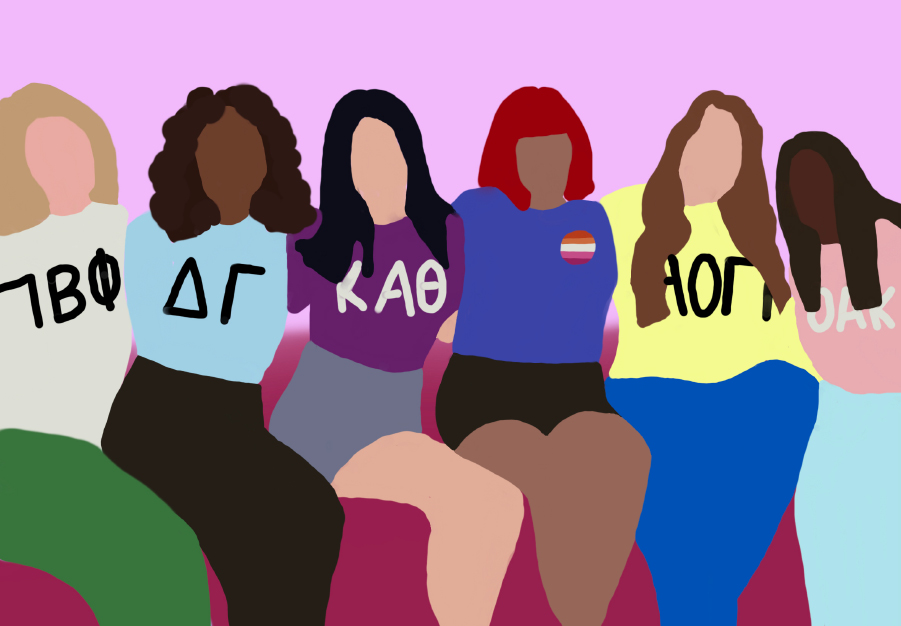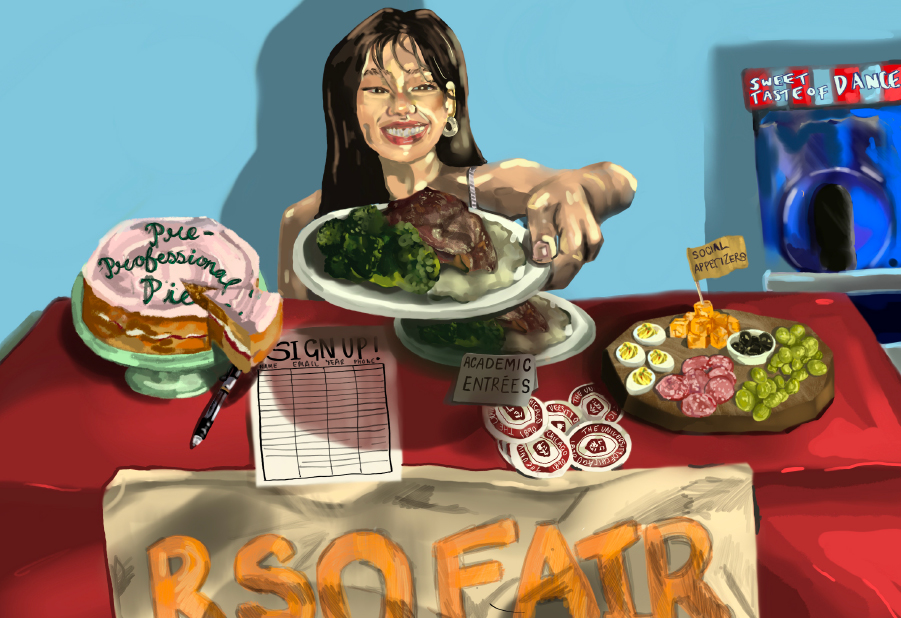I don’t know much about sororities. A friend in Pi Phi has told me about group songs and voting traditions and a brother getting kicked off a boat at formal. I’ve seen the aesthetic instagram accounts and posts from champagne and shackles. I’ve even rolled up a friend’s old sorority banner in my blinds, three Greek letters magically unfurling with the closing of curtains.
It never crossed my mind to join a sorority. As a Bay Area lesbian with no familial connection to sororities, the most I knew came from Bama Rush TikTok videos and the documentary those inspired, pastel dresses and high heels, and news of Artemis Langford, the first trans woman to join a sorority in the state of Wyoming; she faced a torrent of harassment and even a lawsuit. Even UChicago has its own sorority lore that felt heteronormative in an unapproachable way: champagne and shackles, Arrowfest, white dresses and tan heels on Founders’ Day.
But UChicago is in no way one of a kind with the schools that boast the stereotypical sorority. Here, Greek life is just one part of sisters’ lives. The campus’s four recognized sororities (as well as Oak) don’t have houses. There are no sororities dedicated to particular affinity groups. The UChicago student body tends to think less about Greek life than others. But even two years into my UChicago career, my spectator’s understanding was still that “queer” and “sorority” were contradictory. No matter the culture, no matter the campus, the word sorority meant something heteronormative. And maybe at UChicago, it still does to an extent. Accordingly, I decided to interview members from UChicago sororities to see if my perceptions held up in a space I knew was unique to the national.
Over the course of two weeks, I reached out to a number of and ultimately spoke with six queer past and present members from Pi Beta Phi (Pi Phi), Delta Gamma (DG), Oak, and Kappa Alpha Theta (Theta). I found that UChicago sororities are accepting but still heavily heteronormative, leading to a feedback loop that projects and caters to femininity and attraction to men.
In my interviews, the overwhelming sentiment was that being queer had little overtly negative effect on sorority life, especially in queerer organizations like DG. Though it might be the norm, femininity and heterosexuality are in no way a prerequisite. Madeline Hopper, a third-year in DG who identifies as a lesbian, joked that she couldn’t “imagine any gayer sisterhood than watching a women’s softball game.” She also emphasized that there’s almost always a pants option for formals. “If you seek out sexuality, it can be your primary thing, but if you don’t want it to be, it doesn’t have to,” as Anika Khanna, a bisexual second-year in Pi Phi, noted. At UChicago, one doesn’t have to attend mixers, champagne and shackles, or other more heteronormative events to be integral to the sisterhood—though Oak disaffiliate Alyssa Manthi noted that the organization has recently started mandating a certain number of attendances at mixers.
Though being a queer sister doesn’t come with overt adversity, it certainly comes with a different experience: one where sexuality is less significant. Interviewees cited talking about their sexuality less than others (if at all), attending fewer mixers, and many cases of ebbing or already severed involvement.
For the most part, sororities simply aren’t queer spaces. Both in their composition and activities, “[sororities are] catered toward heterosexuality because there are overwhelmingly more heterosexual people,” says Khanna, “so it wouldn’t even make sense to have something catered toward homosexuality.” And though that might be the logic of the world in general, sororities in particular lack queer pockets and queer spaces (though Hopper did note DG’s affinity groups). For the most part, from mixers to philanthropy events, events with a link to sexuality are predominantly in conjunction with frats and men.
To fit in such a space, a necessary level of femininity allows queer sisters to fit within their sororities. It’s self-selecting, says Khanna: “If I were a woman who wasn’t openly feminine in my presentation, a sorority just may not appeal to me because that’s just not the people who are in a sorority.” Without piercings, dyed hair, and a light complexion, Khanna said of herself that she doesn’t “appear obviously gay.” This seems to be the norm, with most queer members from DG to Oak presenting feminine. One Theta member even admitted to feminizing her outfits during the rush process and acknowledged that most girls fit the mold of the hyperfeminine, straight sorority sister. Another sister said that her ex-girlfriend had hated attending sorority events, “because she didn’t feel like her version of queerness was supported as much.” There’s something potentially alienating about explicit or visible queerness. And though that might not be externally enforced, a standard of femininity necessarily creates outliers.
And though queer sisters in DG and Pi Phi knew a significant number of other queer people—in contrast to those in Oak and Theta who believed themselves the only out queer people in their respective sororities—Manthi added that “there’s a really high chance that [queer sisters] are also [attracted to] men,” further allowing sisters to fit comfortably into conversations about men or attend “match-making” events at fraternities. An anonymous second-year in Pi Phi who identifies as bisexual echoed this sentiment: “I feel like there are a lot of queer people, but the vast majority are attracted to men… People are surprised when they learn that there are a lot of bisexual people because there’s no way to know.”
Even interviewees admitted to assuming heterosexuality upon meeting new sisters and being surprised when someone was queer. With minimal queer visibility, sororities might forget their queer members who exist in small and often invisible numbers. Manthi, who identifies as queer, noted that “If [she] weren’t [also] into men, [she] would feel very outcasted or siloed,” with activities often “centered around men.”
The clear linkage to fraternities strengthens this heteronormativity through mixers that have a clear “hookup culture undertone” or “weddings” wherein a sister “marries” a fraternity brother, bridal party and groomsman to match in the quintessential symbol of heteronormativity. One DG interviewee recounted such an event, where an Alpha Epsilon Pi brother “welcomed the women’s rugby team” to their “first straight wedding,” the frat having to apologize after. A Pi Phi member also mentioned the annual—and mandatory for sisters—event Arrowfest, where the majority of performances are centered around the oddity of homosexuality in a heteronormative space: “A majority of the performances were guys taking their shirts off and pretending to kiss each other. Everyone in the audience would laugh, and I was like, ‘What’s funny about that?’”
Consequently, with low queer visibility and high heteronormativity, sororities experience a feedback loop that caters and appeals to a certain level of femininity and attraction to men. As one queer Pi Phi sister put it, “Subconsciously, people gravitate towards those who look like them, which can lead to sort of homogenous femininity in a sense.” Gemma Lippman, a lesbian who was in Pi Phi for two quarters, echoed this statement, describing feeling like she didn’t fit “the vibe [the sorority] was looking for” and that it was no one’s fault, they were just “different people who cared about different things.”
Even DG experiences this self-selection, with queer people gravitating towards it for its outward discussions of queerness. Hopper, who was encouraged to join DG by members of her rugby team, praised the group for representing queer people on DG’s social media, who explicitly discussed their sexuality. Khanna recalled a friend who had heard there were lesbians in DG, consequently selecting the group alone during recruitment.
This feedback loop can be partially attributed to a national discourse of sororities as hyperfeminine and hyperheterosexual, causing even queerer, quirkier spaces like UChicago to fall into this cycle. When asked about their perceptions of sororities before entering UChicago, interviewees called sororities “not only straight but hyper-heteronormative,” “straight and white,” and “not the easiest place to be a queer person.” Predispositions of heteronormativity—even if they’re scaled back at UChicago—discourage queer people from joining sororities if they don’t see their identity reflected in the space. And the cycle repeats itself.
Though UChicago’s sororities are far from those that scream “We’re so glad you’re finally here,” hands reaching through the doorway toward potential recruits, they remain predominantly heteronormative and hyperfeminine. Pi Phi, Theta, DG, and Oak are far from queer “unfriendly,” but they aren’t queer spaces just yet (save for DG, which “attracts really cool people, and a lot of really cool people are queer,” as Hopper puts it), a phenomenon attributable to a feedback loop of visibility and projected femininity.
Finding a solution seems difficult. Greek life comes with implications of heteronormativity. To a certain extent, a sorority stripped of its heteronormativity might not fit within our social understanding of the category. At a school like UChicago, without shared housing and where the group is just one extracurricular for members, a sorority that forwent mixers, Arrowfest, linkage to fraternities, and hyper-femininity would be hard to categorize between a sorority and a social group. And though there have been pushes at schools like UCLA to create sororities that are specifically for LGBTQ+ members, to make sororities true queer spaces—especially schools with more intense Greek life—would mean dissolving the very boundaries that delineate sorority life. For one, the Oxford Dictionary defines a sorority as “a society for female students.”
But ultimately, queer people make spaces queer. Despite being predominantly heterosexual and partaking in the aforementioned activities, DG has a queer reputation that seems to attract LGBTQ+ people. They highlight inclusion and encourage queer members to join through word of mouth and marketing. And, when the national conversation on sororities is so queer-unfriendly, sororities might do well to emphasize their difference as DG has. For instance, one disaffiliate said that “there just aren’t a lot of gay people, which was probably one of the reasons I felt I didn’t really get along with anyone,” despite others in the same sorority noting a significant queer population. Until these interviews, my perception of sororities’ heteronormativity overwhelmed the reality of sisterhood and belonging. As evidenced by interviews, queer sisters can have entirely fulfilling experiences. Sororities just need to make that known.
Explicit inclusionary tactics and marketing towards queer populations might change the reputation of sororities and alter the composition of the current feedback loop. If queer people believe they can genuinely fit into sororities, there is true potential at UChicago for a growing body of—what I previously believed to be oxymoronic but now understand as heavily present and fulfilled—queer sorority sisters.
Camille Cypher is a third-year in the College.
Editor’s Note, October 9, 2024: This article has been edited to correct inaccuracies in the described traditions of the sororities mentioned.
















zman / Oct 17, 2024 at 1:57 am
I thought sororities weren’t allowed at the UofC. The story I heard was that the Noyes family donated money to the College under the condition that no sororities were to be established at the College. You know … Ida Noyes Hall? Did they change the name or tear down the Hall for DEI purposes?
Elton John / Oct 12, 2024 at 2:02 pm
Trojan Whores
Freaks infiltrating the Greeks
Jillian H. / Oct 9, 2024 at 11:38 am
I particularly enjoyed the open-mindedness with which the author approached this topic, especially as she is biased toward the community she wrote about!
Amanda S. / Oct 8, 2024 at 9:21 am
This rambling propaganda piece, with its laughable praise of softball games and “pants options,” is nothing more than an exercise in identity-obsessed self-congratulation.
The very notion that sororities should contort themselves to accommodate every conceivable permutation of identity politics is manifestly absurd. We are supposed to believe, no doubt with rapturous applause from the “grievance set,” that UChicago’s sororities ought to transform into paragons of inclusion by sprinkling in a few token queer members? Really? The delusional notion that these institutions, steeped in centuries of tradition, ought to become bastions of “queer acceptance” is a grotesque affront to reason. Sororities were, are, and should remain institutions rooted in tradition, exclusivity, and the preservation of proper societal norms. Sororities are meant to cultivate femininity, elegance, and the values that underpin a functioning society. They are not—nor should they be—safe spaces for every fringe identity under the sun.
The author bemoans the supposed “heteronormativity” of sororities—well, of course they’re heteronormative! That’s the point! Sororities exist to cultivate relationships with men, to celebrate femininity, and, yes, to maintain a certain standard of conduct that modern progressives find so threatening.
What we see in this screed is not a critique of sororities, but rather an all-out assault on the very fabric of our societal institutions. The author longs for a world in which tradition is utterly annihilated, where every institution must bow at the altar of inclusivity and diversity. This glorious pinnacle of modern culture—yoga pants and push-up bras as the uniform of the day, parading around as if the exposure of every inch of flesh is some grand feminist statement, a world wherein hypersexualization is celebrated as “empowerment,” and plastering one’s body across social media and “experimentation” elevates the human condition. In this world, modesty and dignity are relics of the past, tossed aside in favor of skin-tight leggings and midriff-baring tops.
Let the author and their ilk gnash their teeth. Let them lament the “heteronormativity” of sororities. It is all in vain. The fact remains: these institutions endure because they represent something far greater than the fleeting whims of social justice warriors. They represent tradition, order, and the values that bind our civilization together. No amount of woke pontificating from a petulant sycophant will change that.
Amanda S.
Mike Hunt / Oct 4, 2024 at 6:25 pm
Freaks & Geeks
More gibberish from the woke!
I see a future green haired barista in the making….
Helen / Oct 12, 2024 at 11:35 am
Mike Hunt,
This joke is overused. Maybe check out Wiki How’s “How To Tell A Joke.”
Hope this helps!
Best,
Helen
Undergrad English Major / Oct 1, 2024 at 11:34 am
“Finding a solution seems difficult. Greek life comes with implications of heteronormativity.”
Why do we need to find a solution to this? There are queer spaces and straight spaces at this school. As I understand from this article, sororities at UChicago neither exclude nor cater to queer individuals. If the majority of students are straight in these sororities, it makes sense that they are interested in men and interact with them.
Regardless of one’s queerness, the age-old problem of sororities remains. It’s a popularity contest! The queer and straight students who fit in are comfortable in these social groups. Those who do not fit in are not comfortable.
Dr Ruth / Sep 28, 2024 at 12:30 pm
Who cares?
More inane shit from the grievance set…
Richard / Oct 2, 2024 at 4:35 pm
Did you even read the article?
Anita / Oct 4, 2024 at 8:16 pm
We read it. It’s terrible. Utterly incomprehensible to anyone whose brain hasn’t been corrupted by the wokerati.
Kevin DuBois (BA, MBA) / Sep 24, 2024 at 6:12 pm
Oh dear—more solipsistic gobbledygook from this woman. Veritable woke drivel, the ramblings of a blue-haired gender studies major whose prospects do not exceed the neighborhood Starbucks. My eyes glazed over at the title alone.
Camille, the world does not care about “heteronormativity” or your sexual preferences. TMI. Keep that to yourself. If you move through life telling yourself that unless you can force other people to play along you’ll ‘be ‘erased’, if the slightest hint that another person doesn’t see you the way you’ve labelled yourself feels like an attack on your very existence, your life will be spent in a state of miserable insecurity and fragility.
Do focus on your scholarly pursuits. Stop playing victim dress-up.
——
Dear Maroon editors, can we please get some conservative views for a change? At least quit platforming whiners.
Reginald St. Fingerbottom / Oct 2, 2024 at 11:27 am
Dubois my good man! Charmed to find you in this unexpected sophomoric graveyard of puerile concern. I haven’t had the pleasure since our rousing game of tallywhackers some moons ago. Slightly humorous topic to concern yourself with, don’t you think old chap? Especially since we so vigorously whacked tallies together last we met? And as I recall, you insisted on playing both victim AND dress-up with me that very night! Anywhom, give the wife my best.
– Reginald
Dirk Digler / Oct 13, 2024 at 11:55 am
Despite being heavily impacted into place, look what seems to have fallen out of the bottom…
Perhaps a member of one of the 234,432+ imaginary genders.
Eden / Oct 3, 2024 at 3:43 am
I can tell your eyes “glazed over” when you read the title of this analysis of Greek life at U-Chicago, because your comment indicates a severe lack of reading comprehension. In no way does the author attack sororities, but merely points out that Greek life has defining heteronormative rituals and characteristics. I recommend actually reading this, and other media that falls outside of your belief system, without the biases that seem to control your life.
Anita / Oct 4, 2024 at 8:27 pm
“In no way does the author attack sororities, but merely points out that Greek life has defining heteronormative rituals and characteristics.”
Which is precisely what the commenter objects to!
You people have no sense. Really. Your performative, sanctimonious outrage cannot distract from how moronic this article is.
Let me be clear: it is absolute trash. Trash writing and trash subject. Fodder for uppity woke shills that have infested the university like yourself.
Plain Truth / Oct 12, 2024 at 2:05 pm
Heternormative?!?!
WTF is that?
How about “normal”…that sums it up.
That hits the mark.